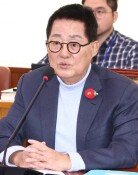Public rental housing alone cannot resolve jeonse crisis
Public rental housing alone cannot resolve jeonse crisis
Posted December. 12, 2020 07:59,
Updated December. 12, 2020 07:59
“We will open the era of two million public rental housing units in 2022,” South Korean President Moon Jae-in said at a briefing on “livable rental housing” held on Friday at a public rental apartment complex in Dongtan, Hwaseong. “Many people still live in poor conditions, such as a small room or a goshiwon. We will make sure that they can move to affordable and comfortable public rental housing units and reinvent poor residential areas into public rental housing,” he added.
It seems that he tries to resolve the real estate issue, which has been the main driver of his falling approval ratings, by expanding public rental housing. The event was attended by current Minister of Land, Infrastructure and Transport Kim Hyun-mee and her successor and the CEO of the Korea Land and Housing Corporation (LH) Byeon Chang-heum to showcase the willingness to maintain the public-led provision of housing, such as the LH and the Seoul Housing & Communities Corporation (SH), even under new leadership.
The expansion of public rental housing is essential for the residential stability and livelihood of the vulnerable groups. Once the share of public rental housing in all housing surpasses this year’s OECD average of eight percent and increases to 10 percent by 2025, the rental market may experience price stability benefits. What’s problematic is, however, that public rental housing alone cannot replace the private rental market, which accounts for 30 percent of the entire housing market. Advanced countries in Europe also refrain from providing excess public rental housing due to concerns about the huge financial burden from a deficit structure and expanding slums.
Even if public rental housing broadens its target to the middle class with improved quality, it will face limitations in meeting customers’ needs, such as proximity to work, educational environment, and long-term investment values. The public’s cold reaction to the head of the future housing planning council Jin Sun-mee who praised public rental housing that there is barely any difference compared to her apartment unit confirms a low preference for public rental housing by the middle class. In addition, housing prices and deposits for long-term leases continuously rising even after the government announced on November 19 to expand mid-size public rental housing provision demonstrate again that public-led housing provision alone will be limited in stabilizing the real estate market.
Minister nominee Byeon instructed the Ministry of Land, Transport and Maritime Affairs to develop plans to provide more housing in the city center of Seoul even before his confirmation hearing was held. It remains to be seen what policies will be put forward, but the housing market will not budge unless the idea to prevent any development profits for the private sector is changed. He must keep in mind that – while public-led housing is important – the worst crisis of deposit-based lease and rental will not be resolved unless the housing market is recovered to normal.







